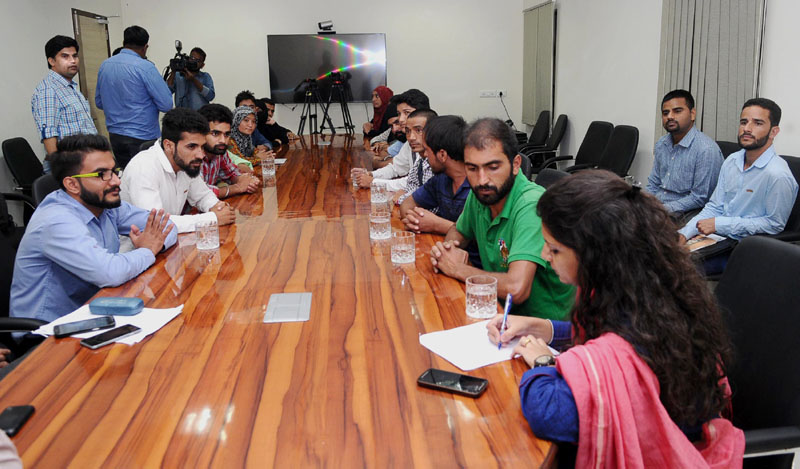Lives of Kashmiri Students Outside the Valley: Dearth Of Accommodation And Acceptance

NEW DELHI: Kashmiri students in Delhi have significantly differing experiences. While some have had it relatively easy, finding accommodation, facing unnecessary scrutiny by both legitimate and self-proclaimed authorities, often with harassment remains an everyday reality for most of them.
"I changed places and there were people who refused or were reluctant to rent out their properties to me," says Daniyal, a student of Hindu College and a resident of Baramulla district.
Renting flats, finding Paying Guest accommodation, interviewing for hostels is one of the major problems. "When I first came here (Delhi) from Aligarh, I tried to find a flat in Okhla Vihar. They were clearly suspicious of me," says Shafat Wani, a student of Jamia Millia Islamia University and a resident of Handwara. "They asked for my election card, wanted to know about my background, asked for my documents, explicitly mentioned police verification. Some were simply too averse."
This is not simply a problem for Kashmiri men, Kashmiri women have been victims of this, as well. "I lived in PGs, and it was not easy finding a place. There was this lady once who asked me if I was a Muslim," says Sobia, who's from Srinagar. “She didn't have any problem with that, she continued saying this is a very good place, we have an AC, we have a TV, but the moment she asked me where I was from and I said I'm a Kashmiri, she said stuff like it's too cold in the winters, there is no geyser, you won't be comfortable here. I said I'll get a rod, work it out, but she kept insisting that there is less accommodation. After asking her what was wrong, she said 'actually we are sort of scared of Kashmiris, you people are like this and that'." Sobia was simply baffled and shocked. This had happened with her for the first time, but for her male Kashmiri friends this was a recurring crisis.
Moreover, some hotels have also denied admission to Kashmiris on random pretexts. Shafat Wani also mentioned how a hotel declined his PAN card as a valid identity for booking a room. Ifsha, a student of Miranda house, was denied a room for 'official reasons' on the eve of Republic Day.
There have been reports of raids in Jamia Millia Islamia's hostels ahead of Independence day. Saroofa Zargar and Shafat, both students of the same university alleged that the raid was for Kashmiri students in particular. The latter also believes that there has been an increase in surveillance in the university and on the Kashmiri students for the most part. Students also hint at racial profiling, but this was not confirmed.
In addition to this, most of these students have to be careful of who they choose to interact with. Sadaf Wani, Ifsha, and Daniyal mention that the largely pleasant experience they've had in Delhi has a lot to do with how careful they are in their interactions.
"It does have to do a lot with the environment," says Ifsha," I was at times but not in a bad way. It was mostly curiosity about me being a Kashmiri and people would be inquisitive about the situation back home. But that has also got to do with the environment and space I was in. The campus being a space where one can discuss issues and have varied opinions. I have friends in other colleges (non-DU) where they have been discriminated against for being Kashmiris.”
"They aren't discriminatory acts in isolation and yes they do reflect a certain attitude towards the Kashmiri people. The problem is of ignorance. A large chunk of the population is ignorant of the intricacies of the Kashmir issue and they feel just by forcing individuals to reiterate that they are 'nationalistic', the entire problem will go away." says Sadaf Wani, an economics student in Delhi University. He was referring to the recent attacks on Kashmiri students in Haryana and other states.
"The pleasant experience has a lot to do with the fact that I generally steer away from strictly political conversations with people especially if I'm uncertain of their intellectual development," says Sadaf. "So most discussions I have had on Kashmir are with people who more or less are aware of the situation in Kashmir. People will always use blanket ignorant statements like, " what will you guys do in Pakistan" or " how will you self sustain" or " India is your best bet. We do so much for you". So when I detect that patronising tone, I know there is no scope for a discussion.”
While speaking of discrimination against Kashmiris, Saroofa Zargar mentions that it starts as soon as their identity is visible. According to Ifsha, students from Kashmir have to in a way 'invisibilise' themselves so that they do not come under scrutiny. The parents who send their kids to study out of Kashmir often caution them, are adamant that their kids don't participate in anything 'political' and worry significantly more than others. "I'm a Muslim Kashmiri woman," says Zargar who is vulnerable as she says on all “three fronts”.
Their experiences have been a blend of the good and bad, but it's evident which of these two dominates. The good comes from their skill in ‘invisibilising” themselves, and the bad is present in the environment from which all the Kashmiri students seeking education and work opportunities outside the Valley try hard to protect themselves.


